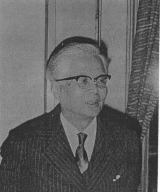©1970 The Japan P.E.N.Club
@
Serizawa Kojiro
@
@
@
@
@
@
@
@
@
@Serizawa Kojiro ( 1897 °@1993 ) was born in Numazu in Shizuoka Prefecture. His family had inherited the title of a fishermen's over-seer,and he led a very secure existence as a child. When he was flve, however, his father decicled to become an evangelist in an ascetic sect. the Tenri Sect. and he was forced into abject poverty. His father's decision to adopt a religion which renounced all material gains and the hardships suffered during his youth greatly influenced his spiritual development and his subsequent literary work. He studied French law in a Tokyo higher school, graduated from the Department of Economics at
the Imperial University,and became a civil servant in the Ministry of Agriculture and Commerce.@
In 1922, he resigned his post and attended the Sorbonne as a student of economics. During his stay in France he associated with
numerous scholars, writers, actors, and artists -men of culture and intellect. He also succumbed to tuberculosis and had to flght his way back to health. These two experiences prompted him to choose the life of a writer.
Returning to Japan in 1929, he successfully competed in a writing contest held by Kaizo,an omnibus magazine, with the story, Burujoa (Bourgeois, 1930) and began his career.
He has written a number of novels bascd on his own experiences, but they do not take the distinctive form of the Japanese gIh
novel. Serizawa's deep understanding of the social sciences, which he had studied as a young man, and his wide, cosmopolitan background, gained through his overseas experience, have been blended with what might be described as his native literary lyricism.
Through this European intellectual approach, he has succeeded in establishing a unique position in the history of modern Japanese literature for himself.
Due to his humanistic style, in the pre-war
period he was called a liberal, and through such works as Hashi no temae (In Front of the Bridge," 1932), he was even regarded by some as a "fellow traveller." During the war he was advised to join the armed forces and to serve in Southeast Asia, but refused for reason of health.
Afer the war,Pari ni sisu(J`irai mourir à Paris, 1954) and Hitothu no sekai(La findu Samurai, 1955) were published by Robert-Laffont of Paris.
He earned several prizes abroad, and in 1957 was nominated for the Nobel Prize in Literature. Today he is writing Ningen no unmei(gFate of ManCh1962|j, a voluminous,autobiographical novel which might be considered his life work. Part I, consisting of six volumes, had been already published and the first volume of Part 11 came out last spring. The course of events during the Meiji, Taisho, and Showa periods are pictured through the growth and development of its hero-Serizawa's alter ego. The entire work represents a study of the Japanese people. Hayashi Fusao ( 1903- ) , a novelist, says : gFor the Jalpanese, it is far more interesting than Jean Christophe. h Last year he received the Fine Arts Award from the Minister of Education.
@

